
With a global pandemic that controls our lives and the changing climate, the resilience of crops has become a crucial factor in our struggle to produce food with dwindling resources. The enduring topical question we face: "How can we achieve food security for a growing global population while trying to completely change our food production systems to reduce the pressure on our natural environment and other finite resources?"
In the search for answers, Koppert Biological Systems, as a world leader in innovative solutions for agriculture and horticulture, has invested much of its knowledge and research in finding microbiological solutions to both current and future food production issues such as plant health and resilience and resistance to drought, diseases and pathogens.
'Having initially focused on entomological solutions to combat pests in agriculture and horticulture, Koppert has always been aware that it was necessary to respect the whole plant, both above and below ground, when it comes to plant health. Today, an increasing proportion of our resources are invested in microbiological solutions, says Peter Maes, Corporate Marketing Director at Koppert. 'We are convinced that plant health that is achieved in a biological way, both microbiologically and macrobiologically, can really contribute to solving the problems we face in agriculture and horticulture today.'
'There would be no life on Earth without bacteria, fungi and viruses – these are essential to improve agricultural productivity', says Ed Moerman, Argronomic Development Expert at Koppert. We have a number of microbiological solutions for diseases such as Pythium, Fusarium and Rhizoctonia, and pests such as white fly. Trianum is a product based on the fungus Trichoderma harzianum T22 that not only protects plants from soil diseases but also promotes plant vegetation. It enables plants to cope with abiotic stress and produce good yield and quality under conditions with few resources.
Changing consumer behaviour
There is a growing awareness that agricultural systems need to change in order to improve food security and protect biodiversity and the environment. At the same time, the current global pandemic has accelerated consumer pressure on sustainable food production and safe food.
The empty supermarket shelves during the lockdown in many countries have prompted consumers to take a critical look at industrialised food production systems while focusing their attention on their health. People were reminded of the role that food plays in their resistance to disease. Within days of the outbreak of COVID-19, buying patterns began to change: more than ever, people bought their food and other products online, with many making direct purchases from local farmers through food boxes and/or home sales. At home chained by the many measures, consumers increasingly ate at home. There has rarely been more interest in the origin of our food.
At Koppert, we expect that consumer awareness and the pressure they are exerting on food production will increase. 'People are becoming increasingly critical of the use of chemical agents and that is why we are increasing the production of microbiological solutions worldwide', says Peter Maes. 'We believe this is the way to improve future food production, a food production where microbiological solutions can contribute to soil health and plant resilience to stress, a new world to explore.
Microbes are essential for the overall functioning and well-being of the ecosystem. There's still a lot of research to be done. 'At Koppert, we are aware of the enormous potential that the invisible world of bacteria, fungi and viruses can offer food production and are working hard to further develop this potential into affordable products that are proven to be effective to enable more sustainable production methods, resulting in resilient crops that can cope with biotic and abiotic stress and finally deliver end products with a highly visible and nutritional quality' says Ed Moerman van Koppert.
According to the united nations sustainable development goals report, the world is not on track to run out of famine by 2030. 135 million people suffer from acute hunger ... and the COVID-19 pandemic could now double that number, putting another 130 million people at risk of starvation by the end of 2020. The report says there are now calls for a "profound change in global food and agricultural systems... to increase agricultural productivity and sustainable food production to alleviate the risks of hunger'. *
*World Food Day was declared by the United Nations in 1979. It is the day when international attention is paid to adequate, nutritious and safe food for all.
In September 2015, the UN approved the Sustainable Development Goals. World Food Day is held today at various places.
For more info, visit: www.un.org/sustainabledevelopment/hunger/.